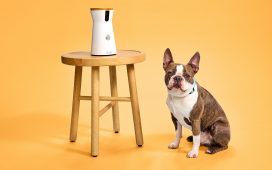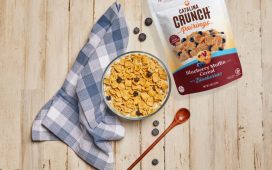PETALUMA, CALIF. – For the past 21 years, dairy products manufactured by Clover Sonoma, Petaluma, Calif., have sported the American Humane Certified seal. The family-owned, third-generation, Certified B Corporation business was the first dairy in the United States to receive the certification. Now it is the first dairy to offer a post-consumer recycled (PCR) gallon milk jug, efforts applauded by climate change activists such as Danielle Nierenberg, founder of Food Tank, Baltimore.
“It’s not enough to be organic,” said Marcus Benedetti, chairman and chief executive officer of Clover Sonoma, to Ms. Nierenberg during a Food Tank webinar on Nov. 18. “When you elevate everything you do and touch, and pass that onto consumers, you connect with them. Consumers want to reward companies that do the right things. The pandemic helped consumers connect the dots.”
Mr. Benedetti explained Clover Sonoma’s passion is to elevate dairy to keep it a viable business. This strategy includes investing in sustainable packaging to help address climate change.
Starting with 30% PCR content in its organic gallon milk line, the company has committed to increasing the PCR content and extending PCR content use across all Clover Sonoma gallon milk jugs by 2025. Using PCR content in plastic packaging creates a closed loop system for recycling plastic gallon milk jugs and ensures plastic is neither created nor destroyed but re-used.
“Clover Sonoma is willing to make an investment for the future,” said Bob Carroll, vice president of business development, California Milk Advisory Board (CMAB), Tracy, Calif. “Consumer sentiment towards plastic is negative. So this is the right thing to do.”
Mr. Carroll cited a 2021 perceptions study conducted by a dairy industry coalition that showed while 70% of California consumers said recyclability is important to them, nearly half found the milk jug difficult to recycle and 32% of those consumers reported they didn’t trust it will be recycled.
Further, with regulations in both California and Washington now requiring use of PCR in certain packages, Mr. Carroll believes it is good business for the dairy industry to be proactive in this space.
“Two-thirds of plastic milk jugs wind up in landfills and it takes a thousand or so years to break down,” Mr. Carroll said. “As an industry leader, Clover Sonoma wanted to do its part.”
The PCR jug story should pique consumers’ interest and get them to “Pour it. Cap it. Bin it.” That’s the message of the “Recycle the Jug” campaign.
“California consumers are dedicated to doing their part to recycle but many don’t understand that the high-density polyethylene or No. 2 plastic used for plastic milk jugs is one of the most widely accepted plastics in recycling programs across the US,” said John Talbot, CEO of the CMAB. “It’s highly desirable by recyclers because of its value and ability to be turned into new materials. We want to encourage consumers who buy milk in the jug to make sure that jug makes it to the recycling bin to help keep plastic out of landfills.”
Seeing that plastic go back into Clover Sonoma’s milk jugs is hopefully the validation consumers need to know their efforts are worth it. Mr. Carroll hopes it’s the “spark to get others to follow.”
“The more consumers put their milk jugs into the recycling bin, the more responsibly made packaging we can make, and that’s something consumers can feel good about,” said Yin Woon Rani, CEO of MilkPEP, Washington.

This is not the first time the dairy said “no” to plastic. Clover Sonoma made the decision to years ago reduce plastic waste by not adding plastic recloseable caps to paper cartons.
“To reach our sustainability goals, packaging innovation is a priority for us as a company,” said Kristel Corson, chief revenue officer at Clover Sonoma. “Finding sustainable solutions means taking risks and investing in what’s best for the planet. We are focused on improving our packaging across product lines using reusable, recyclable, renewable and environmentally conscious resources. We encourage the food industry to join us in this effort.”
A few months ago, the company introduced a new children’s dairy brand – Clover the Rainbow – designed to teach children about eating a variety of fruits and vegetables as part of a healthy diet. The brand supports the company’s commitment to elevating dairy to keep it a viable business for future generations.
“We know the importance of family, so the decision to produce the highest quality dairy products for kids felt natural,” Mr. Benedetti said. “This new organic food brand provides necessary nutrition to growing kids and helps support good eating habits through a balanced diet.”
The brand launched with three organic yogurt smoothies formulated with a blend of nonfat milk, whole milk, fruits, vegetables and probiotics. Available in strawberry carrot, blueberry beet and strawberry banana butternut flavors, the smoothies contain 120 to 130 calories, 8 grams of protein, 14 grams of sugar and 20% of the daily recommended value of calcium per bottle.





